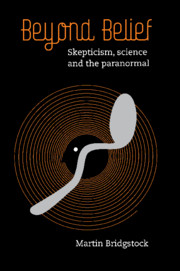Book contents
- Frontmatter
- Contents
- Preface
- Introduction: The paranormal and why it matters
- Chapter 1 The nature of science
- Chapter 2 The paranormal
- Chapter 3 Skepticism – from Socrates to Hume
- Chapter 4 Modern skepticism
- Chapter 5 Bringing skepticism down to earth
- Chapter 6 Skepticism, ethics and survival
- Chapter 7 Skepticism beyond the paranormal
- Bibliography
- Index
Introduction: The paranormal and why it matters
Published online by Cambridge University Press: 05 April 2010
- Frontmatter
- Contents
- Preface
- Introduction: The paranormal and why it matters
- Chapter 1 The nature of science
- Chapter 2 The paranormal
- Chapter 3 Skepticism – from Socrates to Hume
- Chapter 4 Modern skepticism
- Chapter 5 Bringing skepticism down to earth
- Chapter 6 Skepticism, ethics and survival
- Chapter 7 Skepticism beyond the paranormal
- Bibliography
- Index
Summary
Let us begin with a few stories. All are rather startling, and all make a point crucial for this book. In the UK a few years ago four jurors were involved in the trial of a man for murder. One weekend they became drunk, and decided to use an Ouija board. They would contact the spirits of the murder victim and ask who had committed the crime. In the light of the spirits' replies, the jurors had no hesitation in finding the defendant guilty. The Court of Appeal was not impressed with this method of deliberation, and threw out the verdict (Sydney Morning Herald 2001).
Next, we will look at the deaths of two young boys in New Zealand. According to prominent medical authorities, both could probably have been saved. Caleb Moorhead was six months old when he died. His parents, Deborah Ann Moorhead and Roby Jan Moorhead were Seventh Day Adventists and also vegans (which meant that they did not eat meat, fish or dairy products). Caleb was suffering from a vitamin B12 deficiency. The parents received many warnings about what would happen, but stuck to their principles – Caleb's mother said that conventional medicine was ‘Satan's way’ (Guardian 2002) and the parents did not change their son's diet. Caleb died in March 2001 of bronchopneumonia, caused by the lack of an easily injected vitamin (Stickley 2002).
- Type
- Chapter
- Information
- Beyond BeliefSkepticism, Science and the Paranormal, pp. 1 - 11Publisher: Cambridge University PressPrint publication year: 2009



